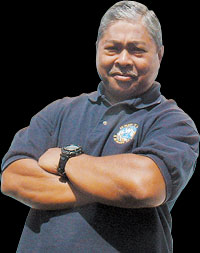Warning: include(/www/specials/filipino100/header.php): failed to open stream: No such file or directory in /srv/users/thaarchives/apps/thaarchives/public/specials/filipino100/lapenia/index.php on line 1
Warning: include(): Failed opening '/www/specials/filipino100/header.php' for inclusion (include_path='.:/opt/sp/php7.4/lib/php') in /srv/users/thaarchives/apps/thaarchives/public/specials/filipino100/lapenia/index.php on line 1
 |
 |
|
|
KEVIN DAYTON | The Honolulu Advertiser |
|
|
| Birthplace: Pepe'ekeo plantation hospital
Family: Wife, Ernesta; two daughters, Lora and Leona; and two grandsons, Kwaylen, 10 and Kanen, 8
First relative in Hawai'i: Father, Eusebio "Andy" Lapenia Sr., who immigrated to Hawai'i in 1930
Occupation: Retired president of Local 142 of the International Longshore and Warehouse Union
Hobbies: Watching his grandsons play baseball and football.
Favorite Filipino foods: Adobo, pork or chicken
|
|
|
By Kevin Dayton
Advertiser Big Island Bureau
HILO, Hawai'i — The Big Island plantation camps that Eusebio "Andy" Lapenia Sr. called home after his arrival from the Philippines were much more than clusters of houses for the Filipino and Puerto Rican plantation workers who lived there.
Lapenia lived in Camp 45 in Honomu, with its outhouses and vegetable gardens and no electricity or running water. It was like many camps along the Hamakua Coast, and the families that lived in those villages became a network of hanai families to Lapenia's son Eusebio Jr., better known as "Bobo."
Bobo Lapenia, who grew up to be one of the most prominent labor leaders in Hawai'i, said even the unattached bachelors in the camps became his mentors, keeping an eye on him while his father worked. Bobo called them "tata," a respectful term for an older man.
As Bobo Lapenia has watched younger generations grow up and move away from the camps, he wonders if they left behind something important.
As many in those generations concentrate on professional success and financial stability, the 63-year-old Lapenia said, "I think our values are kind of skewed."
Lapenia said he sees parents today shower their children with material things "as opposed to spending quality time with them, giving them guidance. That is, to me, kind of destroying the family fabric of what Filipinos really are noted for — the closeness of the family."
"How much money do you need? Everyone has to work and earn a living, but I'm a believer that you have to live within your means. You don't have to keep up with the Joneses to live comfortably. We're all not born to be millionaires."
Lapenia's father was born in Mabanogbog, Urdanet, Pangasinan, Philippines, and left for Hawai'i at age 17 to find plantation work.
The elder Lapenia began work at the Honomu plantation, chopping cane as a field hand. He would later hold a variety of jobs in the mill and in the company warehouse.
The camp residents planted vegetable gardens and raised their own animals for meat. When one resident would slaughter a pig, the meat would immediately be divided up for sale to other residents to avoid waste, because there was no refrigeration available.
Bobo Lapenia said he is unsure how his father met his mother, but the marriage didn't last. His father obtained custody of him when he was 4 or 5 years old.
Because of the long work hours, the elder Lapenia placed the boy with other camp families. Some of those families included more than a half-dozen children, and Bobo lived with them for a year at a time or longer, helping with chores and attending Catholic Mass.
He said he learned the value of work, responsibility, sharing and caring in those homes.
"Until today, I look at them as my family, too," he said. "They took me in, and put up with me."
When Bobo reached the sixth grade, he moved back in with his father, and the elder Lapenia raised the boy as a single parent.
It was in those years that "Bobo" earned his nickname, a nod to his scrappy personality. He would fight the bigger kids when they picked on friends. Consequently, older boys began calling him "Bobo" after Carl "Bobo" Olson, a Honolulu boxer who became world middleweight champion in 1953.
Andy Lapenia, who died last Sept. 12 at age 92, helped with the organizing of workers that set the stage for the 1946 sugar strike.
His son was too young to remember that strike, but he vividly remembers standing in line at the soup kitchens during the 1958 sugar strike, which lasted for more than 80 days.
For Bobo, that strike was a life-changing event.
"That kind of experience makes you appreciate the struggles in later years, the struggles that the working class went through at that time just to make things better," Lapenia said.
Bobo graduated from Hilo High School in 1960 and attended college in New Mexico. He returned home in 1966 to take a job spraying herbicide for a sugar company.
He was quickly tapped by the International Longshore and Warehouse Union, which made him a steward for the herbicide gang, trained him on the contract and employee rights and, in 1973, hired him as a full-time union officer.
Lapenia advanced in the union, and served as president of the ILWU Local 142 from 1991 until he retired in 2003. Before the remaining sugar companies began to close in the early 1990s, the ILWU had nearly 26,000 members in Hawai'i.
Warning: include(/www/specials/filipino100/footer.php): failed to open stream: No such file or directory in /srv/users/thaarchives/apps/thaarchives/public/specials/filipino100/lapenia/index.php on line 72
Warning: include(): Failed opening '/www/specials/filipino100/footer.php' for inclusion (include_path='.:/opt/sp/php7.4/lib/php') in /srv/users/thaarchives/apps/thaarchives/public/specials/filipino100/lapenia/index.php on line 72
